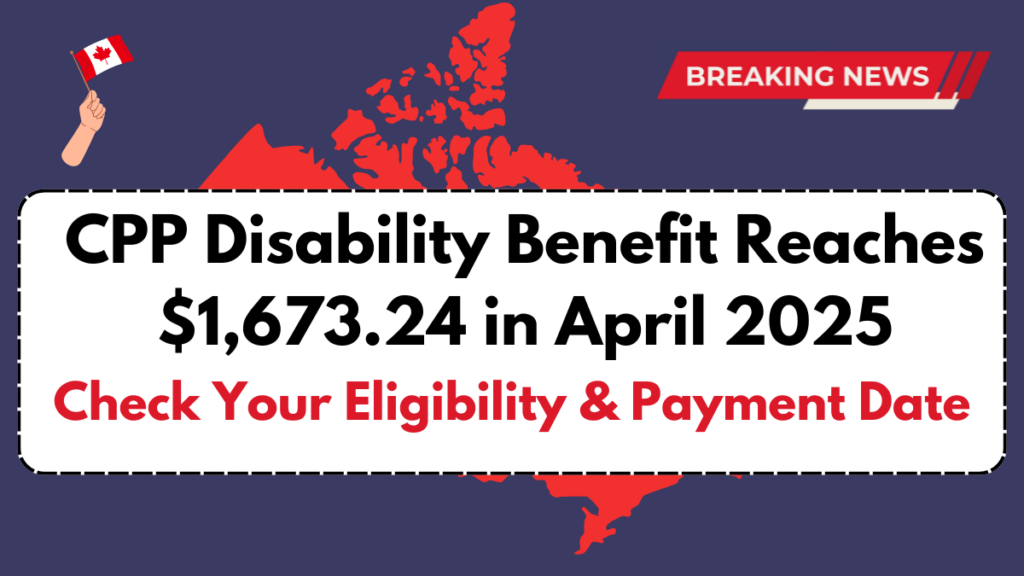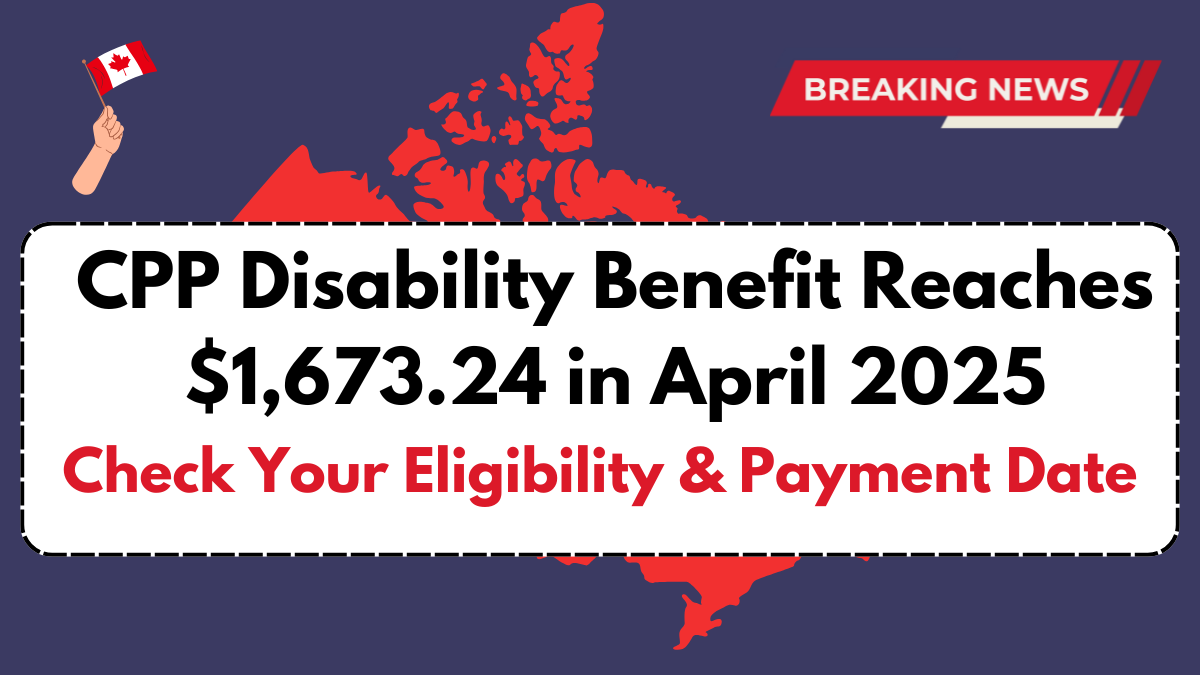For Canadians dealing with long-term health conditions that prevent them from working, the Canada Pension Plan (CPP) Disability Benefit serves as a crucial financial aid program. In 2025, the maximum monthly payment stands at $1,673.24 CAD, providing financial stability to eligible individuals.
This guide covers everything from the April 2025 payment date to eligibility, application procedures, and strategies to maximize your benefits.

Key Details About the CPP Disability Benefit
| Category | Details |
|---|---|
| Benefit Name | Canada Pension Plan (CPP) Disability Benefit |
| Maximum Monthly Amount | $1,673.24 CAD (2025) |
| April 2025 Payment Date | April 28, 2025 |
| Eligibility Criteria | Under 65, severe and prolonged disability, sufficient CPP contributions |
| Application Method | Online via My Service Canada or by mail |
| Children’s Benefit | Yes |
| Official Website | Government of Canada – CPP Disability Benefit |
When Will You Receive Your CPP Disability Payment in April 2025?
The scheduled payment date for April 2025 is April 28, 2025. The government follows a standardized monthly schedule, typically issuing payments on the third-to-last business day of each month.
Pro Tip:
To ensure your benefits arrive on time, enroll in direct deposit through your My Service Canada Account. This method eliminates delays associated with mailed checks.
Who Qualifies for the CPP Disability Benefit?
To be eligible for CPP Disability Benefits, applicants must meet three primary criteria: age, medical condition, and contribution history.
1. Age Requirement
Applicants must be under 65 years old. Once an individual turns 65, the disability benefit automatically converts into a CPP retirement pension.
2. Medical Criteria
To qualify, the applicant must have a severe and prolonged disability, which is defined as:
- Severe: The condition prevents them from working regularly.
- Prolonged: The disability is long-term or permanent.
3. Contribution Requirement
The applicant must have contributed to CPP in at least four of the last six years. However, if the condition started earlier, some may still qualify under a late applicant provision.
For the most detailed eligibility requirements, refer to the official Government of Canada CPP Disability website.
How to Apply for the CPP Disability Benefit
While the application process may seem complex, following these structured steps simplifies it:
Step 1: Obtain the Application Package
- Download the necessary forms from the Government of Canada website.
- Alternatively, visit a Service Canada office for a paper version.
Step 2: Complete the Application Forms
- Provide personal details, including your Social Insurance Number (SIN).
- Outline your employment history.
- Clearly describe how your disability affects your ability to work and daily life.
Step 3: Submit a Medical Report
- A doctor or medical specialist must complete this report.
- The report should comprehensively detail the severity and long-term impact of your condition.
Step 4: Submit Your Application
- Online: Through your My Service Canada Account (MSCA).
- By Mail: Send all documents to the nearest Service Canada office.
Pro Tip:
Always keep copies of all submitted documents. You can track the status of your application through My Service Canada Account (MSCA).
Additional Benefits You May Be Eligible For
1. CPP Children’s Benefit
If you qualify for CPP Disability Benefits, your dependent children may also receive financial support.
Eligibility Criteria for Children:
- Under 18 years old.
- Between 18-25, provided they are enrolled in full-time education.
For more details, visit the CPP Children’s Benefit page on the Government of Canada website.
2. Impact of Other Income Sources on Your CPP Benefits
Receiving CPP Disability Benefits may influence your eligibility for other financial aid programs. If you receive income from sources such as:
- Private disability insurance.
- Provincial social assistance.
- Workers’ compensation.
It is advisable to consult a financial expert to understand potential impacts and avoid unexpected reductions.
Case Study: A Real-Life Example
Sarah’s Story
Sarah, a 52-year-old administrative assistant from Toronto, had been a consistent contributor to the CPP. After being diagnosed with a severe medical condition, she could no longer work. She applied for CPP Disability Benefits, submitted her medical records, and was approved within a few months. Now, she receives $1,673.24 per month, helping her manage living expenses while prioritizing her health.
Pros and Cons of the CPP Disability Benefit
| Advantages | Disadvantages |
| Provides financial support when unable to work | Requires extensive proof of severe and prolonged disability |
| Direct deposit ensures timely payments | May affect eligibility for other income-based benefits |
| Includes additional benefits for dependent children | Processing time can take several months |
| Converts to CPP retirement pension at 65 | Some applicants may be subject to reassessments |
Final Thoughts
The CPP Disability Benefit plays a vital role in supporting individuals who can no longer work due to serious health conditions. Understanding eligibility requirements, application procedures, and payment schedules allows applicants to maximize their benefits effectively. For personalized advice, always refer to official government sources or seek guidance from a financial expert.
For further details, visit the Government of Canada’s CPP Disability Benefit page
Frequently Asked Questions (FAQ)
1. Can I work while receiving CPP Disability Benefits?
Yes, but if your income exceeds a specific threshold, your benefits may be adjusted. Contact Service Canada for precise limits.
2. How long does the application process take?
Processing times vary but generally take several months. Submitting a complete and accurate application helps avoid delays.
3. What happens if my condition improves?
If your health improves and you can return to work, you must notify Service Canada. Your benefits may be adjusted or discontinued.
4. Can I appeal if my application is denied?
Yes. If your application is rejected, you have 90 days to request reconsideration. If denied again, you can appeal through a tribunal.
For More Information Click Here
Pari is a passionate writer known for captivating stories that blend imagination and reality. Inspired by travel, history, and everyday moments, Pari crafts narratives that resonate deeply with readers.
